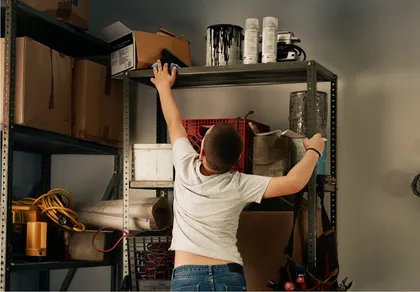Personalized Secure Gun Storage Assessment
Circumstances evolve — and so should the way we store firearms. Whether you have a child or teen in the home, care for an aging parent, or support someone in crisis, take time to make sure every gun in the home is stored securely.
Secure Gun Storage Assessment
Take our secure storage assessment to find the best options for your home — tailored to how you live and store your firearms.
Personalized Secure Gun Storage Assessment
Secure Gun Storage Assessment Results
Considerations for my home
-
Children or teens spend time in rooms where a gun is stored.
Ensure firearms are stored in a locked safe or lockbox, inaccessible to children and teens.
Remember that any unsecured firearm, no matter the location, poses a risk.
Keep keys and access codes in a separate, hidden location, unknown to children and teens.
Avoid storing firearms in common areas, like living rooms or kitchens, where children are often present.
-
Kids in my home — or their friends — might find things I thought were securely put away.
Use a lock box or safe instead of relying on hiding spots.
Unloading your firearm before storage adds an extra layer of safety, especially around children and teens.
Talk openly with children and teens about firearms, and how to stay safe if they or their friends come across one.
Make a habit of reviewing your firearm storage to ensure they are locked and inaccessible to children and teens.
-
Someone living in my home, or visiting my home, shows signs of memory loss or confusion.
Store firearms using a lock or safe that limits access to only trusted adults in your household.
Monitor changes in behavior that may increase risk, and reassess and adapt as necessary.
Discuss safety plans with caregivers, family members, and/or health care professionals.
Consider temporary off-site firearm storage to remove guns from the home if their condition worsens.
-
Someone in my home is taking medication that affects their mood, coordination, or judgment.
Understand that emotional stress can increase the risk of firearm misuse.
In times of crisis, it’s important to reduce access to firearms through secure storage or temporary removal from the home.
Reevaluate access to firearms during times of heightened impairment.
During high-stress moments, storing firearms away from the home can support safety and well-being.
-
Someone in my home is struggling with a mental health condition, fear, or grief that may impact their judgment.
Recognize that heightened emotions and emotional life experiences can affect decision-making.
Reviewing who has access to firearms can support responsible and thoughtful storage decisions.
Talk to a mental health professional about warning signs of crisis, and firearm safety planning.
Consider off-site firearm storage to temporarily limit access to guns during moments of crisis.
-
Someone in my home is going through a breakup, loss, or emotional life experience.
Ensure all firearms are securely stored to prevent unintended access.
Consider off-site gun storage until the situation stabilizes.
Make decisions about firearm access together with people you trust and rely on.
-
Someone in my home is showing signs of crisis and might act impulsively or hurt themselves or others if a gun were accessible.
-
A Veteran in my home is living with PTSD, depression, or anxiety.
Veterans face a higher risk of firearm suicide due to greater access to guns and professional training in their use.
Work together to create a secure firearm storage plan that prioritizes both safety and respect.
Regularly review firearm access, and adjust storage practices as needed.
Call or text 988 for free, 24/7 support from the Suicide & Crisis Lifeline. Veterans can press “1” to connect with someone trained to support Veterans.
-
Someone in my home has professional experience with firearms (e.g. military or law enforcement).
Understand that keeping firearms at home may bring up stress or trauma.
Be aware that military firearm storage habits may not align with home safety best practices.
Re-evaluate access to firearms to help prevent misuse.
Call or text 988 for free, 24/7 support from the Suicide & Crisis Lifeline. Veterans can press “1” to connect with someone trained to support Veterans.
-
I need to access my firearm quickly in case of an emergency.
Quick-access safes allow fast access while keeping it secure from others in the home.
Store firearms unloaded with ammunition locked separately but nearby for rapid access in an emergency.
Use biometric or keypad safes that open quickly but prevent unauthorized use, especially by children or guests.
Practice unlocking and loading your firearm safely and calmly, so you’re prepared if needed.
-
I keep a firearm in my vehicle or travel with one regularly.
Use a lockbox or secured container when storing a firearm in your vehicle, even for short periods.
Check your state and local laws about firearm transportation and vehicle storage to stay compliant.
Keep firearms out of sight when stored in a vehicle to reduce the risk of theft or misuse.
Always store firearms unloaded, and separate from ammunition, even when traveling.
-
I want to protect my firearm from being accessed by anyone who doesn’t live in my home.
Store firearms in a locked safe that only trusted adults in the home can access.
Store firearms unloaded with ammunition stored separately for added security.
Check safes regularly to ensure they are functioning properly and remain secure.
Consider bolting your safe to ensure it remains in its secure location or use a heavily weighted safe that cannot be easily moved around.
I am...
-
A first-time gun owner
 Learn More
Learn MoreYou bought a firearm for a reason. Maybe it was to feel safer, more prepared, or more in control.
But without a plan for secure storage, that same firearm can create risks for yourself and your loved ones.When a gun is left loaded or unlocked, firearm misuse can happen. A child might find it. A visitor could come across it. During a moment of crisis, easy access could lead to irreversible consequences.
-
A Veteran or service member
 Learn More
Learn MoreYou learned to respect your weapon. You kept it clean, stored it right, and never took shortcuts. At home, your firearm deserves the same discipline.
Safe storage is not about giving something up. It is about staying in control. It protects you during tough days and keeps your family safe every day.
-
Someone who carries a firearm for work
 Learn More
Learn MoreYou already know what it means to be responsible with a firearm. You live it every day on the job. But it can be easy to forget that the same rules should apply when you’re off duty too.
A quick decision to leave your firearm unsecured, even for a moment, can have serious consequences.
-
Someone who has a child or teen in the home
 Learn More
Learn MoreYoung people don’t always understand the potential harm a gun can cause. An unlocked gun can lead to serious consequences in just seconds.
By storing firearms securely and keeping ammunition separate, you add a layer of protection that can make all the difference. That extra step can save a life.
-
Caring for an aging loved one
 Learn More
Learn MoreAs people age, their needs change, and so does the way we think about safety. Firearms at home should be stored securely with those changes in mind.
Whether it’s memory loss, vision decline, confusion, or a new medication, aging can make everyday decisions more difficult and sometimes more dangerous. A gun that’s easy to access can increase the risk of unintended harm during moments of disorientation, stress, or crisis.
-
Going through an emotional or difficult life experience
 Learn More
Learn MoreA moment of crisis can happen to anyone.
Secure gun storage practices can create a life-saving safety net when it’s needed most. Sometimes, that extra step is all it takes to prevent a tragedy.
In a Moment of Crisis, Help Is One Call Away
The 988 Suicide & Crisis Lifeline offers 24/7, free, and confidential support for anyone experiencing a mental health emergency. Call or text 988 or visit 988lifeline.org.




